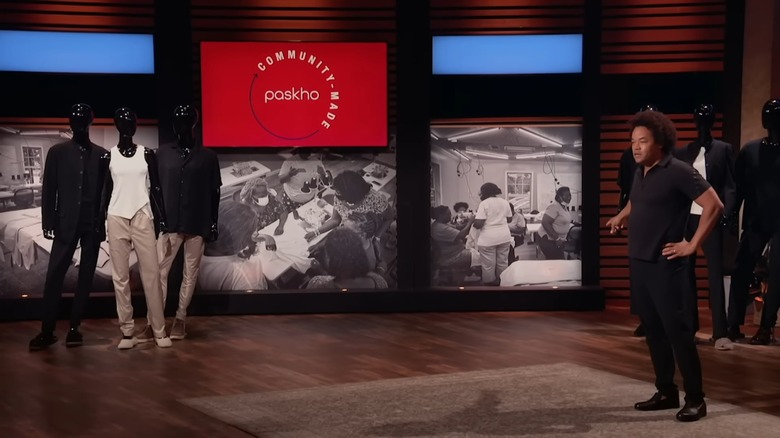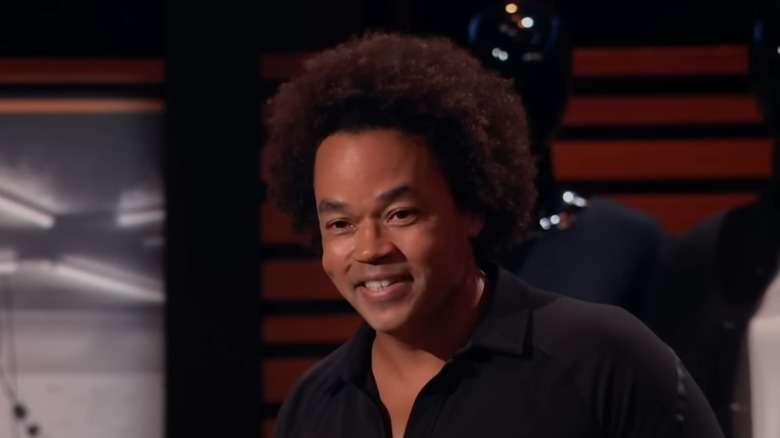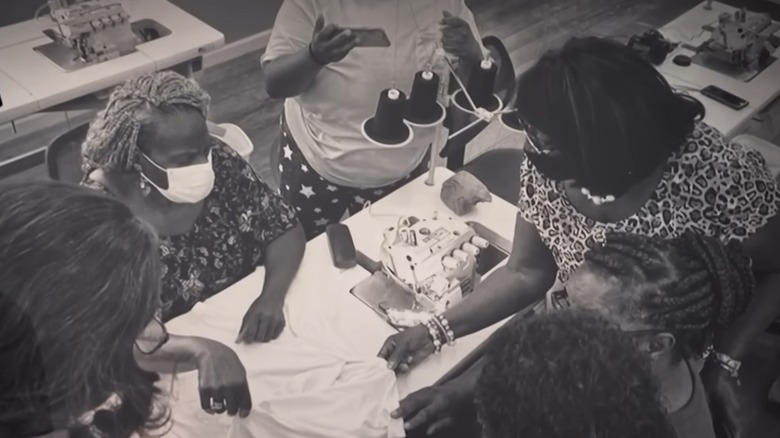What Happened To Paskho After Shark Tank?
In the days of fast fashion, where people want the cutest clothes at the cheapest prices, it's rare to find a brand that focuses on style and quality while fairly compensating the hard workers who make their stuff. Entrepreneur Patrick Robinson understood this issue, so he created Paskho, a modern clothing brand that strives to reduce economic disparity by employing people from remote communities and paying them livable wages. Before Paskho, Robinson made a name for himself by enlivening declining fashion brands.
His impressive portfolio cited staples like GAP and luxury brands such as Paco Rabanne, but eventually, Robinson began to question the industry he loved so dearly. Speaking to FASHIONADOTV, Robinson recalled pondering how inhumane the fashion industry could be, and the amount of waste it generated due to overconsumption. So, he sought to create multipurpose clothing to reduce the need. But Paskho's mission changed during the pandemic when Robinson invested his savings into the company to ensure his employees could survive the tough time.
He began to realize that so many people struggled through the pandemic because they lost their jobs, so Robinson pivoted the brand's social mission toward creating better employment conditions in the U.S. To this day, Paskho has stayed true to its core values while its clothes continue to fly off the shelves and impress consumers. But that might be surprising to some because the Sharks weren't exactly jumping at the opportunity to invest in the company despite their impressive sales.
Patrick Robinson kept his cool as the Sharks attacked
Patrick Robinson went into the Tank with a steep valuation of $20 million, requesting $500,000 for 2.5% of Paskho. Emma Grede instantly recognized him as a prominent name in fashion and Robinson proudly shared that his 2019 sales were a whopping $6.7 million, but despite this, the company wasn't profitable due to the $95 customer acquisition cost. In 2021, Paskho would estimatedly have $4.5 million in sales. However, the brand still incurred multi-million dollar losses due to scaling costs and a drop in sales during COVID.
Grede couldn't understand why Paskho didn't thrive during the pandemic because his line featured so much chic loungewear but Robinson attributed this to the pivot in his business model when their core changed to better employment opportunities. Grede suggested that maybe Paskho hadn't excelled as much because Robinson either didn't know how to communicate the brand message or the customers didn't care enough about it. Mark Cuban added that if the social media messaging was right, the customer acquisition cost wouldn't be as high, so he was out.
Grede couldn't join Paskho for similar reasons, but she advised Robinson to pay close attention to the customer's demands because she felt he'd ignored them. Kevin O'Leary expressed his lack of confidence in Robinson's entrepreneurial abilities, arguing that the business model wasn't strong enough to gain his investment. Barbara Corcoran also didn't make an offer because of the lack of business clarity. Before "Shark Tank," Lori Greiner hadn't built a clothing brand, so she couldn't help Paskho either.
Paskho continues to do good
Although Paskho isn't one of the most successful "Shark Tank" products, it still seems to be going strong. Many of the most highly-rated products on their website are sold out, and they seem to function on backorders. Although they haven't disclosed their sales, Pashko has received tons of love since its appearance on "Shark Tank." Fans were impressed by Patrick Robinson's calm and respectful demeanor towards the Sharks, and Paskho got several prominent media features in the likes of Conde Nast Traveler.
Despite the Sharks advising Robinson to focus more on social media messaging, Paskho's accounts aren't hugely active. Given Robinson's designer roots, it's unsurprising that they're consistently expanding their product line. In February 2023, Pashko added a top created by the talented craftspeople at the Cheyenne Indian Reservation, with the promise of adding more, and Robinson proudly shared that they'd be employing more people in the existing pods. In April 2023, Robinson flew to Mississippi to try and form a new pod consisting of the Choctaw tribe.
Despite its initial pivot in core values, Paskho has stayed true to its mission of sustainability. They've collaborated with several environmental and social justice missions. And, according to their website, Paskho uses 43% reclaimed fabrics to create clothes. Throughout their manufacturing process, they avoid the 900 toxic chemicals typically found in chemical fabrics. By using recycled envelopes instead of plastic bags for shipping, they've reportedly saved 8,000 kg of CO2 emissions. Additionally, if the company's social score wasn't already good enough, they've also been donating 1% of total revenue towards environmental causes.


